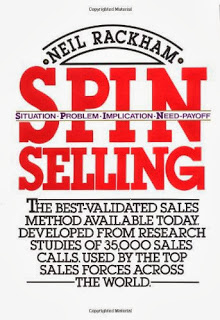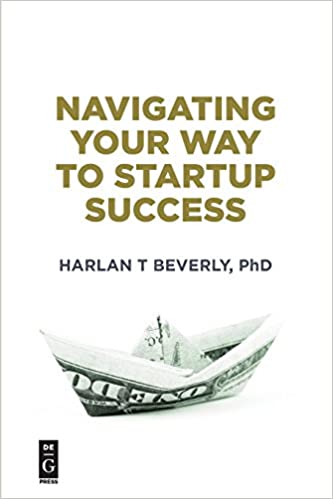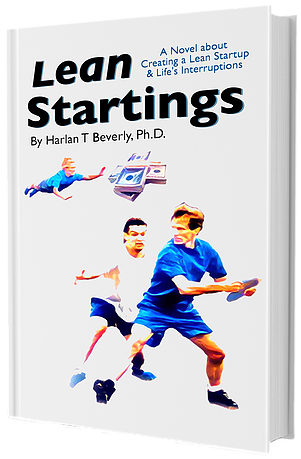“Wow, that was so cool, it really works!” – University of Texas Engineering Undergraduate
This was the general sentiment this week when I demonstrated the SPIN Selling technique to a group of undergraduates (mostly engineering-types) who are studying entrepreneurship at The University of Texas in the 1 Semester Startup Class (now called Longhorn Startup). I volunteered to demonstrate the approach on their very first sales call (yes they are really that far along, and I’m so proud of them! They have overcome the first and second hurdle of entrepreneurship: 1. Selecting a Target Market. 2. Getting over their Fear.).
So what is SPIN Selling? And why is it a great technique for Engineers? Read on My Friends!
First, SPIN Selling is a technique originally developed by Neil Rackham.. in his book SPIN Selling.
- SPIN Selling is great for engineers because it is an easy to understand acronym: S=Situation Questions, P=Problem Questions, I=Implication Questions, N=Need-Payoff Questions
- One of the best approaches to sales naturally emerges by “following the process” which, following processes is easy for engineers to do.
- This process is one of ‘connecting to the client’, ‘understanding their needs’, and ‘fitting or not fitting your product to satisfy their true needs’…. if you can connect the dots for the prospect: the sale is just a natural thing!
- And they’ll want to buy from YOU specifically, not necessarily because your product is superior (a concept Engineers need to not focus on), but because you understand them best, and have built a rapport with them through “the process”.
- The Process:
- Ask a few “Situation Questions” to get them thinking about their business, not yours: Initially on the call or in the meeting, simply ask how his/her business or life is going and uncover the specifics of their business as it might relate to your product.
- Examples: How is your business going? How do you measure success? What kinds of files do you use? Who are your clients? etc.
- Ask a few “Problem Questions” until you uncover a problem you might be able to solve: Basically try to uncover what problems they have (not if, we all have problems).. Focusing on Throughput or Cost (throughput questions are ones of ability to deliver product/service, or inability to get new clients/customers)… cost is cost and headache (mental cost). Obviously, focus on those areas which your product/service might solve…
- Examples: Do you feel you have plenty of clients? Do you have any major cost problems? Are you able to fulfill all your orders on time? What is preventing you from being more successful today? What gives you the biggest headaches today?
- Ask enough “Implication Questions” such that they agree that the problem is serious: Try to get them to see the light that the problem has real consequences. To understand, for example, that those extra costs are cutting in to margins, which slows growth. Or that the lack of enough customers means you are wasting resources from under-utilization.
- Examples: Do you agree that the lack of customers means you are under-utilizing your fixed resources? Do you agree that the extra costs you are incurring is hitting your bottom line, and that extra cash you could have had would be useful to help you grow? Do you agree that your headaches might be making you distracted on other issues?
- Ask enough “Need-Payoff Questions” such that they agree a solution has real value. Need-Payoff sort-of restates the Implication question in such a way that a solution has real value. Once they agree to real value… then, and ONLY THEN, can you pitch your product/service…. and it will be in their terms…
- Examples: Do you agree that getting rid of that headache would let you be more productive at other more important things? Do you agree that your increased productivity is worth real value? In hours per day? In Dollars per day? Do you agree that being able to get more customers has real value? In Dollars per Customer? Do you agree that reducing costs impacts the bottom line directly? In real profit dollars?
- Now, and only now that they agree there is real value in a potenial solution, are you permitted to pitch your idea… AND ONLY PITCH IT IF YOU CAN GIVE THE PAYOFF (or a part of it) THEY AGREED TO IN STEP 4. If not, continue with Steps 2-4, until you can or until they hang up!
- The pitch should be short, just 3 slides (more on this next time): Benefits, Tech, Price.
- Don’t talk to the slides, talk to how YOUR PRODUCT might help solve THEIR PROBLEM… And point back to those NEED-PAYOFF questions you asked.
- Finally, Ask a few “Qualifying Questions”, and then “ASK FOR THE SALE”: You need to “flip the conversation” to be more about potentially fitting them to your business…. Now, they need to SELL YOU!
- You truly want it to seem like buying your product/service means belonging to an exclusive club.. and only some people are PERMITTED TO BUY!
- You questions now are “Qualifying Questions”… here is some good ones:
- We want to work with ‘thought leaders’ and ‘early adopters’, how forward-thinking about new stuff is your company?
- It is important that we work with companies of just the right size, how big is your business?
- We want partners who will become our reference customers, if things we work together to solve your problems, would you be willing to be a reference customer?
- Alright… it seems like we might be a good fit… it also seems that OUR PRODUCT/SERVICE will really help SOLVE YOUR PROBLEM and has a REAL DOLLAR IMPACT TO YOUR BUSINESS…
- ASK FOR THE ORDER!!!!
- How many units can we sell you today to see how well this works? or
- What size initial order can you place today to test our ability to deliver? or
- Who in your organization needs to sign off on this deal?
- Level Up!
- Regardless of the answers to step 6… be sure you try to “level up”.
- Often-times in a big sale, it takes many approvals and other folks to help decide.
- Leave EACH MEETING with a date/time for the next meeting and try to “level-up” the meeting…. TRY TO ATTEND ANY APPROVAL MEETINGS IN PERSON.
- Bring up all you have learned about their problem and the NEED-PAYOFF in REAL DOLLARS! (I hope you took notes).







